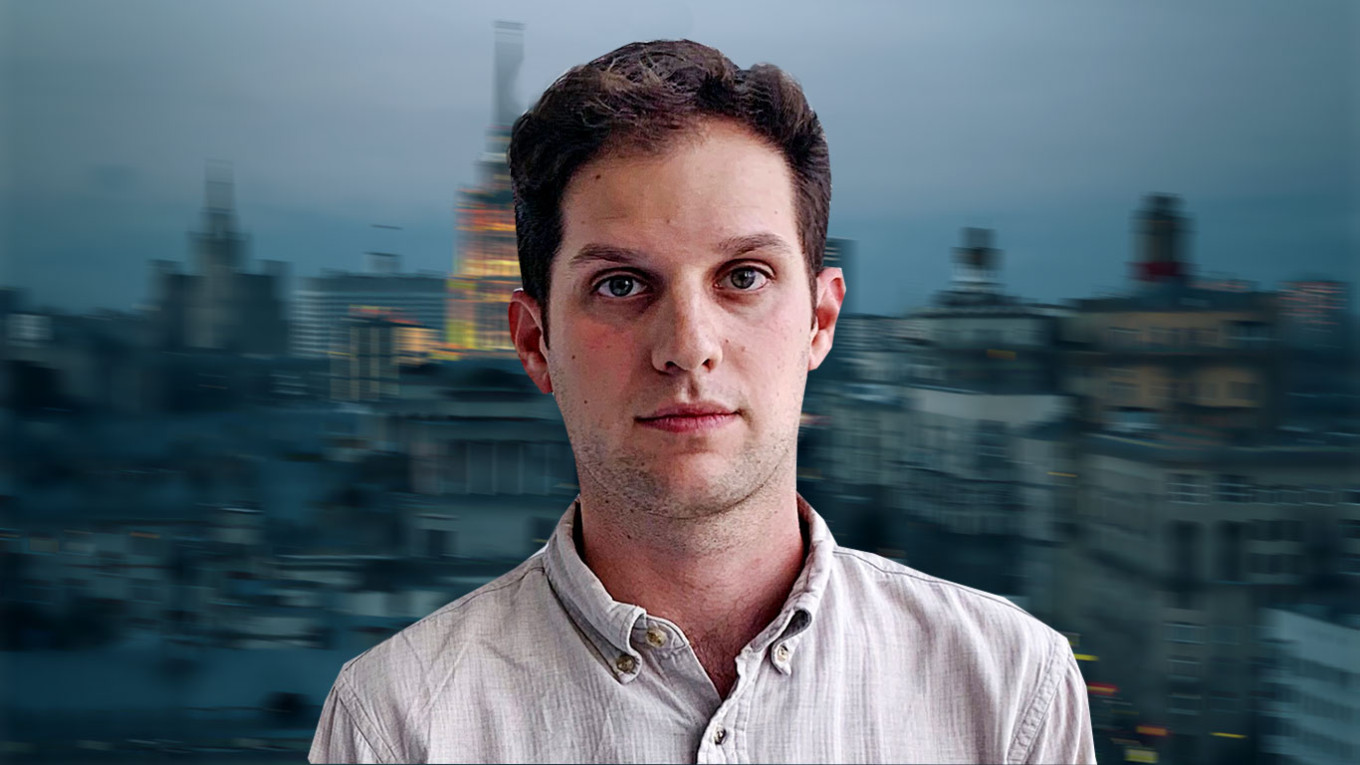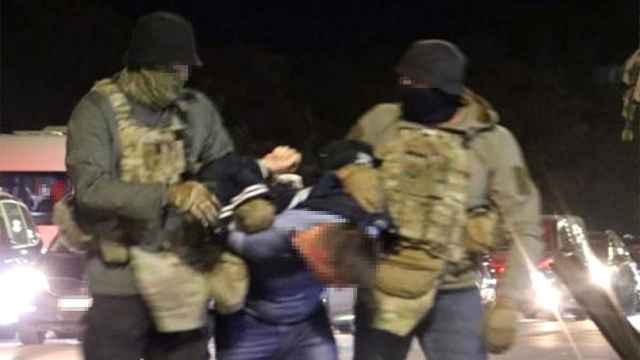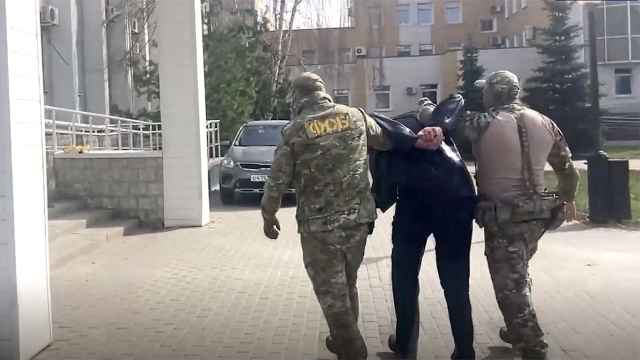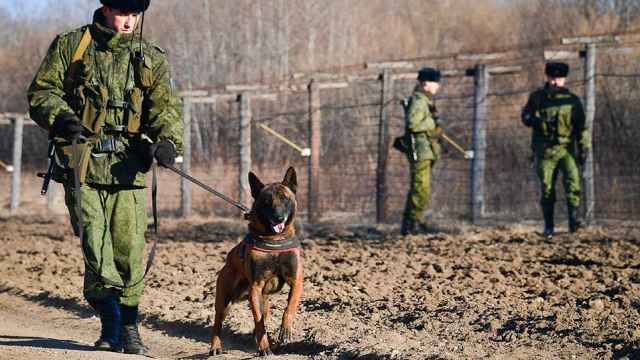It took some time after I first saw the breaking news alert — that Evan Gershkovich had been detained in Russia — for the horror to sink in.
As more details emerged of my former colleague’s arrest, the more it felt like a bad dream. The Federal Security Service (FSB) had detained him while reporting a story in the Ural Mountains city of Yekaterinburg and was now holding him on suspicion of espionage. He is the first Western reporter to face such accusations in Russia since the Cold War.
My memories of Evan keep flitting in and out of my mind, colliding at full velocity with the blunt and devastating fact of the present: that he is now facing charges which can only be described as absurd, and which will likely see him sentenced to up to 20 years behind bars.
I first met Evan in 2019, when I moved to Moscow to join The Moscow Times, where he had already been working since late 2017.
But it wasn't until he and I found ourselves in Riga, Latvia for a month that spring on a visa run gone awry (don’t ask) that I really got to know him.
Over shared meals and drinks around the city, he told me of his upbringing in New Jersey with his parents, who were Jewish exiles from the Soviet Union, and sister. We bantered about the cultural differences between Russia and the United States, our home country.
He carried around a well-worn olive-green backpack whose holes he had darned like his mother taught him to do.
A big fan of soccer, he would patiently explain to me what was happening on the bar’s television as his favorite team, Arsenal, played a match.
He cooked me dinner in his Riga apartment, using the skills he’d picked up in a New York City kitchen where he moonlighted while working as a news assistant for The New York Times.
We had only known each other a few weeks, but I shouldn’t have been surprised by this generosity. Evan didn’t think twice about gestures of kindness.
He moved about the world with confidence and ease, seeming to relish in the very act of being alive. He could strike up a conversation with just about anyone. He was quick with a joke and gifted with an acerbic sense of humor.
Beyond his fluent Russian — something I coveted — he genuinely loved Russia and embraced it fully, from the idiosyncrasies of long-haul Russian train travel to the rituals of the banya. Russia, for Evan, was a home.
He viewed the world through a straightforward, realist lens with little trace of cynicism or idealism. And he was in many ways unshakeable. As he recounted in graphic detail the brutality of Russian police against opposition protesters that he’d witnessed, I uttered an expletive. He just shrugged: That was just the reality of it, he seemed to say.
From the day I met him, he had had a clear vision for his career and was incredibly driven to realize it. He was always hunting down the next story — and when it came to the story itself, he would always do it justice to the best of his ability.
In the year and a half that we worked together at The Moscow Times, covering Russia felt like penning a long, drawn-out obituary for rights and freedoms. Evan was devoted to covering this story and sharing it with the world with the fairness, humanity and rigorous fact-checking it demands.
He covered topics ranging from the Moscow opposition protests that got widespread Western attention to less-reported issues like the erasure of minority languages and environmental degradation.
He also played a key role in MT’s coverage of the pandemic, which often scooped major Western outlets with stories on how medical students were being deployed to Covid-19 wards and how Russia was vastly under-reporting its death toll.
What I remember most about Evan is his readiness to offer guidance. His advice always came without pretension or precondition, nor did it reek of the chauvinist condescension that I can detect like a drug-sniffing dog.
In the summer of 2020, I was reporting a story on a proposed law to ban transgender Russians from changing their gender on their documents.
Evan called me up. He had been in contact with a transgender woman who’d fled the country in anticipation of the law’s passing, he said, and thought my piece was missing a personal account such as hers.
“I don’t want to make it seem like I’m coming in and rewriting your story,” he told me.
The story was much better with his contribution.
In summer 2020, he left The Moscow Times to join the Moscow bureau of Agence France Presse. As the months passed, we didn’t keep in touch, apart from one or two chance encounters at parties. At the end of one of those nights, he hugged me as he said goodbye. I was surprised that he did that — we weren’t exactly close friends — but I shouldn’t have been. That’s just who he was.
When it was announced in early 2022 that he was joining The Wall Street Journal as a Russia correspondent, it felt right.
Just weeks later, Russia invaded Ukraine. Virtually every Western journalist swiftly made arrangements to leave Russia, worried that the Kremlin could put us in its crosshairs next in its sweeping crackdown on the press.
That summer, Evan returned to Russia, undeterred by the risks and committed to documenting the country’s wartime descent into dystopia.
That he chose to return to Russia speaks to his courage and integrity. That it has taken his imprisonment for him to be recognized for these traits on a wide scale is a terrible irony.
The trees are blossoming in Amsterdam now, just like they were during that month Evan and I spent in Riga four years ago. I cannot reconcile the dissonance between my life today, in an idyllic Western European capital, with that of Evan’s.
A judge has ordered him to spend two months of pre-trial detention in Lefortovo Prison, that notorious facility that saw many of the atrocities of Stalin’s Great Purge.
In the six days he has spent in detention so far, he has not been allowed to contact his lawyer, his colleagues, or his family. Little information about his well-being has been made public.
His trial will be closed and classified, allowing no scrutiny of whatever evidence the authorities procure for their charges. With acquittals in espionage cases virtually unheard-of, the best chance for Evan to be freed is via a prisoner exchange with the United States.
Everything feels out of place when something so unjust has happened — when a good person has been put in prison for simply doing his job.
But what can we do to help him, apart from wishing for a diplomatic Hail Mary that could take years?
First is to keep up the public attention on his case, whether it’s through sharing posts on social media or attending protests in his support. Officials in Washington and Moscow alike must hear the demands for his release.
Second is to read and share Evan’s reporting. You can find his past reporting for The Moscow Times here. The Wall Street Journal has also removed its paywall for his articles and its coverage of his case.
Third is to let Evan know that there are hundreds, if not thousands of people who are thinking of him.
A group of Evan’s close friends are organizing a letter-writing campaign for those who wish to send him correspondence. You can send a letter to FreeGershkovich@gmail.com, where it will be translated into Russian and mailed to Evan in prison.
As others have already noted, there are no rules on what you can write to him: Jokes, funny anecdotes and memes are just as worthy as sincere dispatches of moral support.
The Evan I knew — no, the Evan I know — is many things: funny, talented, honest, brave and generous. He is not a spy. He must be freed immediately.
A Message from The Moscow Times:
Dear readers,
We are facing unprecedented challenges. Russia's Prosecutor General's Office has designated The Moscow Times as an "undesirable" organization, criminalizing our work and putting our staff at risk of prosecution. This follows our earlier unjust labeling as a "foreign agent."
These actions are direct attempts to silence independent journalism in Russia. The authorities claim our work "discredits the decisions of the Russian leadership." We see things differently: we strive to provide accurate, unbiased reporting on Russia.
We, the journalists of The Moscow Times, refuse to be silenced. But to continue our work, we need your help.
Your support, no matter how small, makes a world of difference. If you can, please support us monthly starting from just $2. It's quick to set up, and every contribution makes a significant impact.
By supporting The Moscow Times, you're defending open, independent journalism in the face of repression. Thank you for standing with us.
Remind me later.








